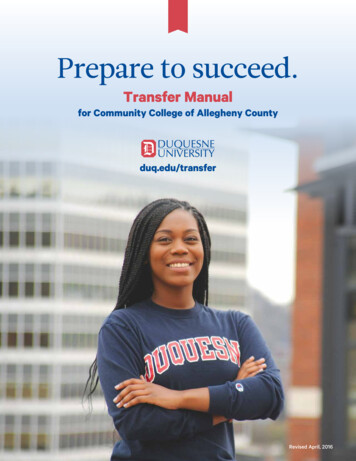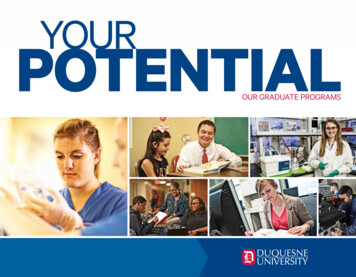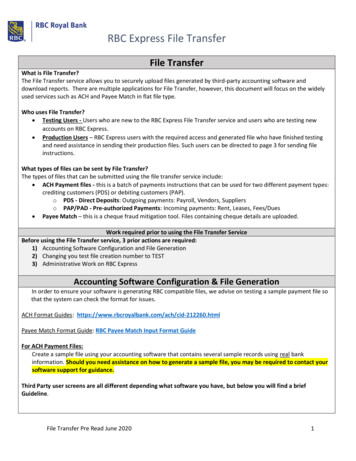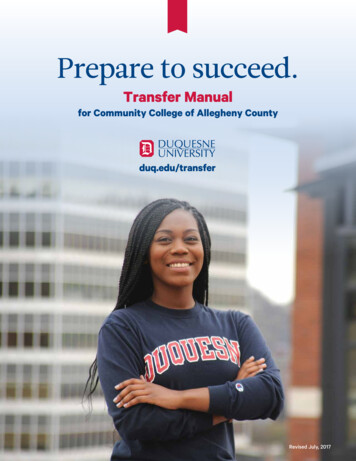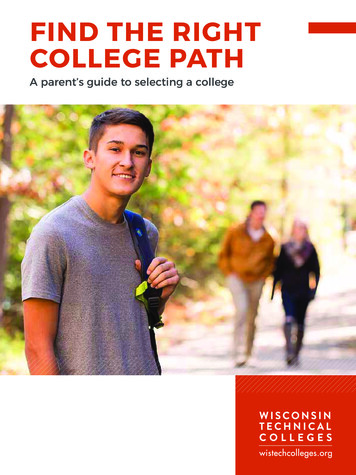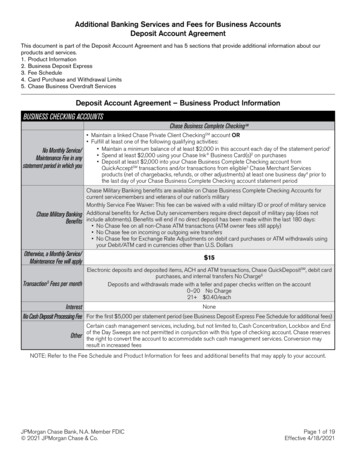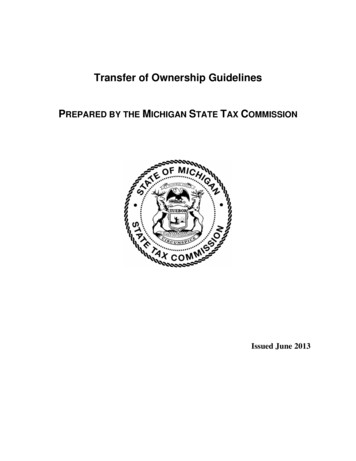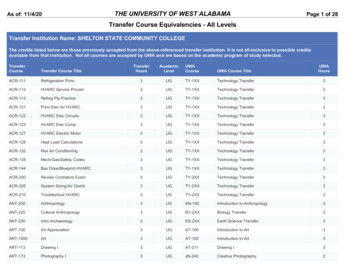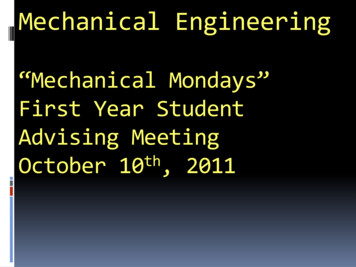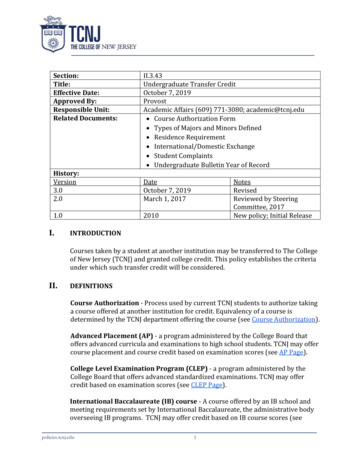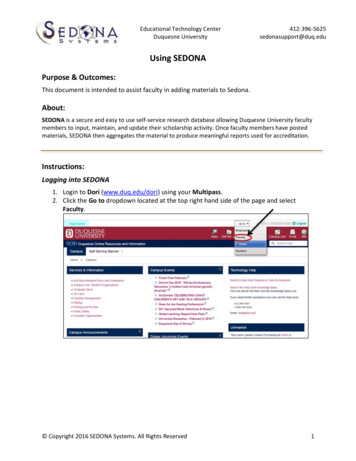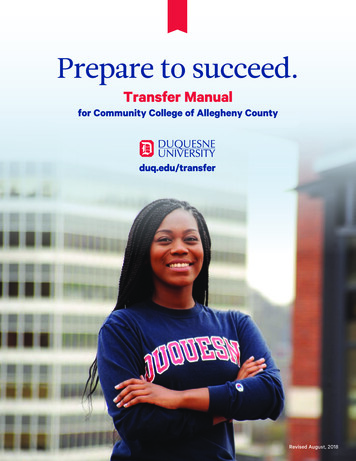
Transcription
Prepare to succeed.Transfer Manualfor Community College of Allegheny Countyduq.edu/transferRevised August, 2018
Table of ContentsGet Ready for Something More.1Admission Process and Requirements.3Financing Your Education.3Degree Requirements.4University Core Curriculum.5College Level Examination Program. 7Palumbo Donahue School of Business Administration.8 Transferable Credits.8 Suggested CCAC Courses.8 Suggested Curriculum.9 Courses Not Accepted.10John G. Rangos School of Health Sciences.11McAnulty College of Liberal Arts.12 Accelerated Online Bachelor’s Degree.12 Academic Policies.13 Curriculum Requirements.13 Transferable Credits.14Mary Pappert School of Music. 22 Programs and Majors. 22 Admissions Criteria. 22 Transferable Credits. 23Bayer School of Natural & Environmental Sciences.24 Curricular Requirements and Policies.24 Transferable Credits.26 Forensic Science and Law.29School of Nursing.30 Admissions Criteria/Nursing Options.30 Nursing Programs of Study.30School of Education. 32 Core Curriculum/Transferable Credit. 33(See University Core on Page 5) Special Highlights. 33 Curriculum Requirements. 33Mylan School of Pharmacy. 35 Doctor of Pharmacy Program. 35
Get Ready for Something MoreMore heart, more spirit, more tradition, more fun,more connections, more opportunity More than TeachersAt Duquesne, the one thing you’ll notice right away is thecaliber of teaching. That’s because our faculty are worldrenowned scholars, researchers and mentors—among the besteducators in their fields—and committed to your experience asa student. With a 14-to-1 student-to-faculty ratio and an averageclass size of 28, your faculty will get to know you by name.Find Your Crowd, Get Involved!As a Duquesne student, you’ll learn with students from allcultural, socioeconomic and religious backgrounds from nearlyevery state and more than 80 countries. There are morethan 200 student organizations on campus, so you can getinvolved in student government, intramural sports or the manyfree or reduced fee activities available to students. For moreinformation, visit duq.edu/student-involvement.A Great Schoolat a Great PriceDuquesne is rated as a best value university by U.S. News,Washington Monthly and Kiplinger’s. These rankingsconsider key factors such as our quality of teaching, thecareer success of our graduates, our four-year graduationrate and our students’ lower levels of debt. And we offerspecial scholarships for transfer students.Articulation AgreementsWhile transfer opportunities are available in all schools,articulation agreements with the School of Liberal Arts andSchool of Nursing make transferring even easier! duq.edu/ccacMilitary and VeteransOnline Options for Adult StudentsDuquesne University enjoys a proud tradition of servingveterans. We have a team of veteran service providers and weare eager to assist you with questions you might have aboutjoining us as a student. For more information on resourcesfor military service members and veterans, please visitduq.edu/veterans.The School of Liberal Arts offers two accelerated online majorsfor working adult students. Students have access to the OnlineWriting Center and Duquesne’s Gumberg Library. Technicalsupport is readily available to students who are new to theonline learning environment. duq.edu/adultlearners11
Live, Study and Make Friends for LifeDuquesne’s living learning centers are our version of residencehalls—only much more than a place to study, hang out and getsome sleep. It’s the epicenter of your personal experience oncampus, the place where you’ll grow into your own and find newfriends for life. duq.edu/residence-lifeCommuters Have a Home Away from HomeIncoming juniors and seniors have the option to live off-campus.The Commuter Center in the Duquesne Union provides a homeaway from home with study rooms, a computer lab and otherresources to support you. duq.edu/commuter-affairsStudy AbroadTransfer students can choose from more than 35 study abroadlocations, including our Italian Campus in Rome and theDuquesne in Dublin program in Ireland. Opportunities includeshort month-long programs starting in May, spring breakawaytrips as well as semester-long programs around the world.duq.edu/study-abroad2Students can choosefrom more than 35 studyabroad locations
Application Processand Requirements*In order to apply for admission as a transfer student at Duquesne,the following items must be submitted:1. An Application for Admission (select Transfer) found atduq.edu/apply5. A personal essay and a letter of recommendation arerequired for the School of Health Sciences only2. A Duquesne Transfer Form from current (or most recent)college only duq.edu/transfer-form6. SAT and/or ACT scores (required ONLY for HealthSciences, Natural/Environmental Sciences, Education,Nursing, Pharmacy) - in some cases the requirement maybe waived if a student has been out of high school for 5 ormore years3. Official, final high school transcripts and/or G.E.D. scores(not required for Business, Liberal Arts, and Music majorswith more than 24 college-level credits)4. Official transcripts from all previous colleges attendedAdditional documents may be required by a particular school/major. See individual school pages for specific school/majorQPA/GPA and other requirements.Requirements: Grade Averages 3.0 GPA for Physical Therapy, Occupational Therapy, SpeechLanguage Pathology, Forensic Science, Pharmacy, RN-BSN,and Education 2.5 GPA for all other majors Only classes with a “C” grade or higher may be consideredfor transfer. 2.75 GPA for Health Management Systems and AthleticTraining*Adult students interested in applying to the accelerated, online bachelor's degree program should visit duq.edu/adultlearners for application details.Financing Your EducationFinancial aid is comprised of scholarships, grants, loans and part-time employmentawarded to help meet the cost of education, which includes tuition, room and boardor a living expense, books and allowances for personal and transportation costs.Awards can be merit- or need-based and come through avariety of sources, including federal and state government,private organizations and the University itself. Duquesneoffers academic scholarships for all transfer students.Apply for any awards by May 1 of each year. When awardsare based in whole or part on financial need, you MUSTcomplete a Free Application for Federal Student Aid(FAFSA) each year. (Duquesne’s school code is 003258.)Since this form also constitutes application for state grants,special attention should be paid to the state grant deadlinelisted with the FAFSA form. For Pennsylvania, the deadlineis May 1.For more information visit duq.edu/financial-aid, emailfaoffice@duq.edu or call 412.396.6607.3
Degree RequirementsAll students, regardless of major, must complete a minimum of 120 credits andthe University Core Curriculum in order to graduate—with the final 30 creditsat Duquesne. Please see school pages for program-specific information.University Core Curriculum (34 credits)Theme Area Courses: 12 creditsCritical thinking, problem-solving, leadership, honesty, integrityand service to others these are the hallmarks of a Duquesneeducation and part of what makes Duquesne graduates standout. They lay the intellectual and ethical foundation studentsneed to succeed and grow as individuals throughout life.Satisfied by taking 3 credits from each of the followingTheme Areas: Creative Arts Faith and Reason (must be taken at Duquesne) Global Diversity Social JusticeThe Core consists of 12 courses or 34 credits from a variety ofdisciplines. These requirements are:English Composition: 6 creditsSatisfied by: First-year Composition and First-Year LiteratureMathematics: 3 creditsSatisfied by: Calculus or Fundamentals of Statistics or Intro toBiostatics or Problem-Solving with Creative MathScience: 3 creditsSatisfied by: Biology or Chemistry or Physics or Earth Science orAstronomy or other approved Science coursePhilosophy: 3 creditsSatisfied by: Basic Philosophical Questions or Introduction toPhilosophyTheology: 3 creditsSatisfied by: Biblical and Historical Perspectives or TheologicalViews of the Person or Global and Cultural Perspectives ofTheologyEthics: 3 creditsSatisfied by: Philosophical Ethics or Theological Ethics orMedical Ethics or Health Care EthicsInformation Literacy: 1 creditSample courses often transferable for the Theme Areas include: Creative Arts: Art Appreciation, Art History, Creative Writing,Painting, Computer Art, Music Performance, CreativeDramatics Global Diversity: Intercultural Communication, GlobalEconomics, Global Literature, Global Geography, AfricanHistory, World Cinema, World Music, Cultural Anthropology,Global Sociology Social Justice: Art and Politics, Race and Literature, NativeAmerican History, International Law, Social Justice inEducation, Perspectives on the Holocaust, Women andPolitics, Survey of Sociology, Women and Gender StudiesNOTE: One Theme Area must represent a history or arthistory discipline and one Theme Area must represent thesocial sciences (Economics, Political Science, Psychology orSociology) Additionally, students must enroll in three WritingIntensive courses which build upon the skills learned in theEnglish composition courses (UCOR 101 and 102) and todevelop advanced writing abilities in order to communicate withthe general society as well as with professionals within theirmajor field of study.In addition to the Core Curriculum, each school has degreerequirements.If you are planning to transfer to Duquesne University, youshould take courses at the Community College that can besubstituted for the University Core Curriculum requirements.As you will see from the list that follows, many CCAC coursesmay be counted as University Core course equivalences.Satisfied by: Research and Information Skills4Courses within this manual are subject to change. Pleaserefer to the University Undergraduate Catalog available atduq.edu/catalog for current course offerings and requirements.
CCAC courses that will satisfy Duquesne University core curriculum requirementsCCAC COURSEDUQUESNE UNIVERSITY EQUIVALENTENG 101English Composition ICore 101 Thinking and Writing Across the CurriculumENG 102English Composition IICore 102 Imaginative Literature and Critical WritingMAT 201Calculus ICore 121 Problem Solving with Creative MathematicsMAT 220Business CalculusMAT 166Probability and Statistics IIBIO 100Life ScienceBIO 133Environmental SciencePHY 107AstronomyBIO 140Food MicrobiologyBIO 151General Biology IBIO 152General Biology IIBIO 160Introduction to Human PathologyBIO 171Introduction to Human PathophysiologyCHEM 109Introduction to ChemistryCHEM 110/111Introduction to Chemistry/LabCore ScienceUCOR 121UCOR 122PHY 100Basic PhysicsUCOR 123PHY 101Earth ScienceUCOR 124PHY 141Physics IPHY 142Physics IIPHY 221Physics/Engin. IPHY 222Physics/Engin. IIPHY 223Physics/Engin. IIISOC 101Introduction to SociologySOC 208Urban SociologySOC 211Racial/Ethnic MinoritiesSOC 212Social ProblemsANT 117GlobalizationETH 101Ethnic and Diversity StudiesETH 111The Historical Development of the BlackCommunity in PittsburghETH 112Understanding Violence in AmericaETH 220History of Pittsburgh Civil Rights MovementUCOR 123Social Justice Theme Area5
CCAC courses that will satisfy Duquesne University core curriculum requirements(continued)6ART 100Introduction to Art HistoryART 103-142Choose one Art CourseART 168Digital ImagingART 170Web Graphic DesignDAN 101Modern Dance IENG 120The Art of FilmFCL 103MythologyMUS 101Intro to MusicMUS 121History of Music IMUS 122History of Music IIMUS 160American Popular MusicMUS 253History of JazzHIS 21320th Century World HistoryGEO 101World GeographyANT 104Native American Indians of North AmericaETH 205Latino Cultural StudiesETH 206Asian-American StudiesPHL 111Religions of the WorldPHL 155EthicsPHL 205Medical Ethics and LawCreative Arts Theme AreaGlobal Diversity Theme AreaCore TheologyCore Ethics
College Level Examination Program (CLEP)A student may acquire credits by achieving a satisfactory scoreon one or more of the College Level Examinations — Subjectand General — listed below. Examinations may be taken atany CLEP Center. Students should check with their AcademicAdvisor to make sure that they are eligible to receive credit forthe particular exams they plan to take. (Students must wait 6months to retake a test.)Students whose total credits, including CLEP credits, do notexceed sixty (60), are permitted to take the following exams.Students who have failed or withdrawn from a course cannotreceive CLEP credit for that course.This policy is subject to change.ExamMinimumScoreCreditCurrent Course EquivalenceAccounting, Principles of653ACCT 214 Financial AccountingAmerican Government503POSC 105 American National GovernmentBiology503UCOR 121 Core Science - Biology604BIOL 111/111L Bio I: Cells, Genetics, Development/BIO 1 LabBusiness Law, Introductory503BLAW 251 Business LawCalculus w/Elem. Functions553MATH 111 Calculus for Non-Science Students554MATH 115 Calculus I505*CHEM 131 Fundamentals of Chemistry I658CHEM 121/122 General Chemistry I and IIHistory of the U.S. I543HIST 203 U.S. to 1877History of the U.S. II553HIST 204 U.S. Since 1877Info Systems & Computer Apps.552COSC 100 Elements of Computer ScienceMacroeconomics503ECON 202 Principles of Macro EconomicsChemistry, GeneralManagement, Principles of503MGMT 261 Introduction to ManagementMarketing, Principles of503MKTG 271 Introduction to MarketingMicroeconomics503ECON 201 Principles of Micro EconomicsPsychology, Introductory543PSYC 101 Introduction to PsychologySociology, Introduction to503SOCI 101 Survey of SociologyWestern Civilization I573HIST 213 Western Civilization IWestern Civilization II563HIST 214 Western Civilization II*Evidence of lab experience (letter from lab supervisor) is necessary.CLEP General ExaminationsStudents with less than thirty (30) credits may take this exam for elective credit.ExamMinimumScoreCreditCurrent Course EquivalenceHumanities563Liberal Arts elective7
Palumbo Donahue School ofBusiness AdministrationTransferable CreditsCCAC COURSECR.DUQUESNE EQUIVALENTACC 104 Financial Accounting4ACCT 214 Financial Accounting3ACC 203 Managerial Accounting4ACCT 215 Managerial Accounting3BUS 103 Principles of Management3MGMT 261 Intro. to Management3BUS 104 Principles of Marketing3MKTG 271 Intro. to Marketing3BUS 108 Principles of Finance3FINC 331 Business Finance3BUS 251 Business Law I3BLAW 251 Business Law3ECO 102 Prin. of Macroeconomics3ECON 202 Prin. of Macroeconomics3ECO 103 Prin. of Microeconomics3ECON 201 Prin. of Microeconomics3BUS 130 Bus. Communications3COMM 202 Bus. And Prof. CommunicationSuggested CCAC Courses8CR.1ENG 101 English Composition I2ENG 102 English Composition II3MAT 220 Business Calculus4BUS 103 Principles of Management5ACC 104 Financial Accounting6ACC 203 Managerial Accounting7ECO 102 Principles of Macroeconomics8ECO 103 Principles of Microeconomics9BUS 104 Principles of Marketing10BUS 108 Principles of Finance11BUS 251 Business Law I A student can transfer no more than 27 credits ofBusiness courses. Economics does not need to becounted as Business courses. A total of 60 credits can be accepted for transfer. Please do not take any other Business courses otherthan those listed, as they will not transfer.
Four Year Sample Plan (Effective Fall 2017)Requirements for the B.S.B.A.FRESHMAN YEARJUNIOR YEARUniversity Core (Subject to Change)Business Core101Thinking and Writing Across theCurriculum3 cr.102Imaginative Literature and CriticalWriting3 cr.101College Algebra3 cr.111Calculus for Non-Science3 cr.132Basic Philosophical Questions3 cr.202Business and ProfessionalCommunications3 cr.100Research and Info Skills*1 cr.19 credits262Global Insights3 cr.331Business Finance3 cr.6 creditsMajor Area of ConcentrationBusiness Info Systems3 cr.103/103LInnovation Experience3 cr.251Business Law3 cr.271/261Intro Mktg/Intro Mgt3 cr.12 creditsTotal Credits 31 CreditsSOPHOMORE YEARBusiness Core284Data for Decision Making3 cr.285Business Statistics3 cr.214Financial Accounting3 cr.215Managerial Accounting3 cr.201Principles of Microeconomics3 cr.202Principles of Macroeconomics3 cr.267Supply Chain Operations3 cr.271/261Intro Mktg/Intro Mgt3 cr.24 creditsUniversity CoreUniversity Core3 cr.University Core3 cr.6 creditsTotal Credits 30 Credits* Recommended by academic advisor.** May be business or non-business elective.3 cr.Major Area of Concentration3 cr.Major Area of Concentration3 cr.Major Area of Concentration3 cr.12 creditsElectives and University CoreBusiness Core184Major Area of ConcentrationUniversity Core3 cr.University Core3 cr.Business or Non-Business Elective3 cr.Business or Non-Business Elective3 cr.Culture Requirement*3 cr.15 creditsTotal Credits 33 CreditsSENIOR YEARBusiness Core368WBusiness Ethics/Global Citzn3 cr.499WStrategic Management3 cr.6 creditsMajor Area of ConcentrationMajor Area of Concentration3 cr.Major Area of Concentration3 cr.Major Area of Concentration3 cr.Major Area of Concentration3 cr.12 creditsElectives and University CoreUniversity Core3 cr.Non-Business Elective3 cr.University Core3 cr.Non-Business Elective3 cr.12 creditsTotal Credits 30 Credits9
Palumbo Donahue School of Business Administration(continued)Students registering for 300-400 level business courses must have successfullycompleted 60 credits and have Junior standing. Students are responsible for knowingand adhering to the prerequisites for those courses in which they are registered.The sample plan has a degree of flexibility. The University Core and Communication/Culture requirements may be taken at any time during the student’s program.Students may consult their academic advisor for further information.Courses not acceptedThe following courses are NOT ACCEPTABLE for directtransfer or credit by exam:10ACC 100INTRODUCTION TO ACCOUNTINGBUS 122BUSINESS STATISTICSACC 110ACCOUNTING APPLICATIONSBUS 140INTRODUCTION TO E-COMMERCEACC 115INTEGRATED ACCOUNTING/MICROBUS 143INTERNET MARKETINGACC 120COMPUTER APPLICATIONS IN ACCOUNTINGBUS 151SOCIAL THEORY AND BUSINESS ETHICSACC 150SMALL BUSINESS ACCOUNTINGPROCEDURESBUS 200PRINCIPLES OF SUPERVISIONBUS 201HUMAN RESOURCE MANAGEMENTACC 201INTERMEDIATE ACCOUNTING IBUS 204LABOR RELATIONSACC 202INTERMEDIATE ACCOUNTING IIBUS 210PRINCIPLES OF RETAILINGACC 204COST ACCOUNTINGBUS 211PRINCIPLES OF ADVERTISINGACC 210PAYROLL AND TAX ACCOUNTINGBUS 212PRINCIPLES OF SELLINGACC 211PRINCIPLES OF TAX IBUS 221PRODUCTION MANAGEMENTACC 221PRINCIPLES OF TAX IIBUS 240SMALL BUSINESS MANAGEMENT IACC 225AUDITINGBUS 245INTERNATIONAL BUSINESSACC 230ADVANCED ACCOUNTINGBUS 252BUSINESS LAW IIBUS 103INTRODUCTION TO BUSINESSMAT 195BUSINESS MATHEMATICSBUS 110PERSONAL FINANCEBUS 115PUBLIC ADMINISTRATIONBUS 117PUBLIC RELATIONSPlease Note: There are only three Business electives in anyBusiness Major.
John G. Rangos, Sr.School of Health SciencesAcademic Programs and DegreesBachelor’s Degree ProgramsThe RSHS offers four-year bachelor’s degree programsin Athletic Training (B.S. in Athletic Training) and HealthManagement Systems (B.S. in Health Management Systems),which follow a traditional curricular design. The academic modelfor these programs is two years of liberal arts and sciencerequirements followed by two years of professional education.Entry-Level Master’s Degree ProgramsThe RSHS offers five-year entry-level master’s degree programsin Occupational Therapy (M.S.O.T.), Physician AssistantStudies (M.P.A.S.) and Speech-Language Pathology (M.S.).The academic model is three years of liberal arts and sciencerequirements followed by two years of professional education.Students in the Speech-Language Pathology program have theoption of completing a master’s thesis.Typically, professional-level education occurs on a year-roundbasis during the fall, spring, and summer semesters. Thesemodels are unique for these professions and provide theRSHS faculty the opportunity to maximally utilize the excellentcore curriculum and science offerings at Duquesne as thebasis for creative, professional curricula. All of the five-yearentry-level master’s degree programs award a Bachelor ofScience in Health Sciences at the end of the fourth year and amaster’s degree at the end of the fifth year. Students in HealthManagement Systems receive a Bachelor of Science in HealthManagement Systems at the end of four years and a Master ofHealth Management Systems at the completion of 36 credits.Students who have already earned a bachelor’s degree will notbe awarded a B.S. in Health Sciences, but will work directlytoward the appropriate master’s degree.Occupational Therapy Doctorate and Doctor ofPhysical Therapy ProgramsThe six year Occupational Therapy Doctorate (OTD) andDoctor of Physical Therapy (DPT) pro grams are clinicaldoctorates, akin to the Medical Doc tor (MD), Doctor of PodiatricMedicine (DPM), or Optometry Doctor (OD), and is not aresearch oriented degree like the Doctor of Philosophy (Ph.D.)or Doc tor of Education (Ed.D.).The Department of Health Management Systems alsooffers a joint degree opportunity with the Pre-HealthProfessions degree program in the Bayer School of Natural andEnvironmental Sciences.Learn MoreTo ensure effective and appropriate scheduling, interestedenrolled students should contact their respective departmentchairpersons as early as possible during their programs tolearn more about these opportunities. Visit the Health Sciencestransfer site for more details: duq.edu/health-sciences-transfer.11
McAnulty College and GraduateSchool of Liberal ArtsAccelerated Online Bachelor’s DegreeMajorsEarn your Bachelor of Science (BS) degree in a convenientaccelerated online format designed for busy adults. Theseprograms, offered by the College of Liberal Arts, are designedfor students who want to earn an undergraduate degree, buthave other life obligations as well.You can earn your undergraduate degree in the following areasof study:Accelerated/Online FormatThe academic year offers five, eight week terms. The onlineformat allows you to participate in discussions and classworkwhen and where it fits best in your schedule.Transfer Your CreditsIf you have undergraduate credits from an accredited college oruniversity you may be able to transfer them and complete yourdegree in less time. In most cases you can transfer up to 60credits from a community college. We can provide you with anunofficial evaluation of your academic credits at any time!Academic Support Your advisor will guide you through the entire process fromregistration to graduation Online access to the University’s Writing Center andGumberg Library New to online learning? We help you to becomecomfortable with online learning through orientationsand technical supportOffice for Military and Veteran StudentsStart earning your degree with Duquesne University-whereveryou are in your military career, from anywhere in the world.We understand the unique needs of our active duty, reserve,guard and veteran students. It is our mission to help youreach your goals.12Computer Systems TechnologyThe Bachelor of Science in Computer Systems Technologycurriculum offers a blend of computer systems and informationtechnology that creates a well-rounded professional who knowshow to think analytically, assess and diagnose organizationalproblems, and select the best solution. It will enable studentsto design, create and manage modern information systems andemploy technologies to solve complex problems in organizations.Organizational LeadershipThe Bachelor of Science in Organizational Leadership curriculumwill give students the ability to help others move organizationsforward in changing times. While the focus of the programis cultivating the ability to lead at any level, individuals alsodevelop and refine skills in critical thinking, problem solving,motivating and empowering others, and communicatingeffectively and persuasively.Learn tlearners
McAnulty College and Graduate School of Liberal Arts(continued)Academic PoliciesArticulation AgreementUpon successful completion of the Associate Degree (“AS”)in either Arts or Sciences and satisfactory completion of theadmission requirements of the McAnulty College, students fromCCAC will be admitted into the Bachelor of Arts or Bachelor ofScience program at Duquesne at the junior level with 60 transfercredits applying toward the Duquesne BA or BS degree. Anycredits that do not satisfy Duquesne’s requirements will count aselective credits.Effective CatalogDegree requirements are those stipulated in the catalog of theyear in which a student matriculates. The student is responsiblefor knowing the requirements for the degree. Requirements maybe changed without notice or obligation. This catalog has beenprepared on the best information available as of Fall 2015. Majorrequirements are those stipulated in the catalog of the year inwhich a student declares the major.Academic LoadWhile a 12-credit schedule in a regular semester is consideredfull-time study, students may normally carry five courses (15-17credits) in one semester. A schedule of more than five courses or18 credits must be approved by the Dean’s Office. Students onacademic probation may not take more than 15 credits. Studentswho wish to carry more than 12 credits of courses in the summersessions must consult with the Dean.Temporary TransfersNo course taken by a student in the College as a TemporaryTransfer at another institution may count toward a Collegedegree unless approved by the Dean.CLEP(See page 6)University-Level Courses Taken While in High SchoolUniversity-level courses taken by entering freshmen studentswhile in high school will be evaluated for credit if the followingcriteria have been met: The courses are recorded on an official transcript from anaccredited institution of higher learning. The grades are C or better.Curriculum RequirementsStudents enrolled in the McAnulty College and Graduate Schoolof Liberal Arts will be required to complete the University CoreCurriculum, consisting of 31 credits for graduation. The coursesare as follows:Thinking and Writing Across the Curriculum3 cr.Imaginative Literature and Critical Writing3 cr.Problem Solving with Creative Math3 cr.*Core Science (Biology, Chemistry, Physics,or Earth Science)3 cr.*Core Theology3 cr.Residence RequirementBasic Philosophical Questions3 cr.The last 30 credits must be taken in residence atthe University.Ethics3 cr.Major/Minor in the Same DepartmentA student may not major and minor in the same department,with the exception of language majors, who may minor in asecond language, majors in computer sciences or mathematics,and certain majors in journalism and multimedia arts, who maymajor in the companion discipline.Sequential CoursesSequential Courses must be taken in proper sequence. Creditwill not be given for a prerequisite course if courses for which itis a prerequisite already have been taken.Theme Areas:Creative Arts3 cr.Faith and Reason3 cr.Global Diversity3 cr.Social Justice3 cr.Information Literacy1 cr.TOTAL34 CR.*For the Core Math requirement, the student may choose to substituteCalculus 111 or 115, Fundamentals of Statistics 125 or Introduction toBiostatistics 225. The Core Science requirement may also be satisfied byone of the following: Biology 121 or 122; General Chemistry 121 or 122;General Physics 201 or 202.13
McAnulty College and Graduate School of Liberal Arts(continued)A maximum of twelve credits in non-Arts and Natural andEnvironmental Sciences may be applied to the B.A. or the B.S.degree. However, if the student chooses an inter-school minor,the maximum for the minor will be applied to the degree, butall other courses must be selected from the Arts or Sciencesofferings.In addition to the Unive
for military service members and veterans, please visit online learning environment. duq.edu/veterans. Articulation Agreements While transfer opportunities are available in all schools, articulation agreements with the School of Liberal Arts and School of Nursing make transferring even easier! duq.edu/ccac Online Options for Adult Students
